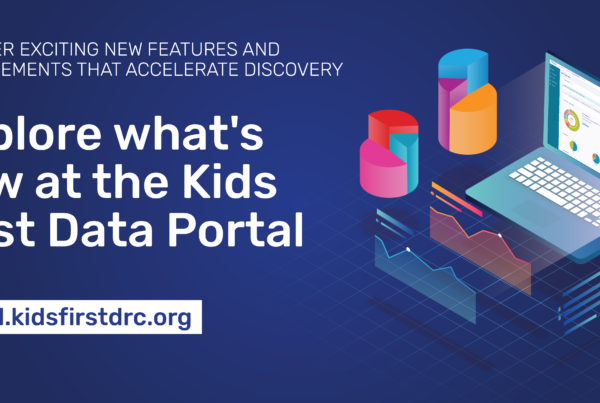At a recent panel discussion hosted live on Facebook by U.S. Congresswoman Jennifer Wexton, experts and advocates in pediatric rare disease came together to reflect on the impact of the Gabriella Miller Kids First Pediatric Research Program (Kids First program) and to look toward the future for cross-disease research and continued development of the Kids First program.
Among the participants were NIH Principal Deputy Director Dr. Larry Tabak, Gabriella Miller Kids First Data Resource Center (Kids First DRC) Principal Investigator Dr. Adam Resnick, and Ellyn Miller, Co-Founder of Smashing Walnuts Foundation and mother of Gabriella Miller (after whom the Kids First Pediatric Research Program is named).
The hour-long discussion included insights about the value of partnerships between patient and research communities, the importance of continued support for pediatric disease research, and the power of collaboration across disease areas, age groups, and research methodologies.
“Two important things for rare disease research nay-sayers to remember. If you were a person with the disease or condition, you wouldn’t think it’s so rare. And, anything that we learn about a rare disease can apply to more common illnesses,” said Dr. Tabak during the panel.
Indeed, the value of pediatric cross-disease research cannot be overstated. And the Kids First DRC remains committed to fostering collaboration through further development of the Data Resource Portal and through interoperability with data commons across the NIH landscape.
New Data
The Kids First DRC has reached an exciting milestone recently, surpassing 20 datasets now accessible through the Data Resource Portal and associated data analysis platforms. Now with 23 datasets, Portal users are able to draw on 1.48 petabytes of multi-omic and clinical data to inform research into childhood cancers and structural birth defects.
On November 18 of 2020, over 5TB of new data were released, related to the Kids First X01 study, Craniofacial Microsomia: Genetic Causes and Pathway Discovery, led by Dr. Daniela Luquetti of Seattle Children’s Hospital. The dataset consists of whole genome sequences (WGS) derived from 222 study participants and 79 trio and trio+ family groups. Data types include aligned reads, gVCFs, and variant calls.
Two more datasets were added to the Portal in December of 2020, containing nearly 5.5TB of WGS data. The first, released on December 2, was generated for the Kids First X01 study, Genetics of Structural Defects of the Kidney and Urinary Tract, led by Dr. Ali Gharavi of Columbia University. The dataset includes 2.74TB of aligned reads, gVCFs, and variant calls, derived from 132 study participants and 44 trio family groups.
Released on December 17, 2020, the Kids First X01 study, The Genetics of Microtia in Hispanic Populations, led by Harvard University’s Dr. Jonathan Seidman, added nearly 3TB of new WGS data to the Portal. These include aligned reads derived from 184 study participants and 165 families.
Portal Features
The Kids First Data Resource Portal’s Explore Data Tool offers a visual, intuitive way to browse available datasets, allowing users to query the database through both drop-down menus as well as interactive charts and graphs.
To augment the Kids First DRC’s HPO Ontology Browser, which allows users to more easily search phenotypic data within the Data Resource Portal, the Explore Data Tool now features a new visual interface to study observed phenotypes. Harmonized using Human Phenotype Ontology standards, users can now examine a more complete hierarchy of ontologies, providing a clearer view of the relationships between higher and lower phenotypic levels than was previously possible. Users can also search by a number of categories including phenotypic abnormality, clinical course, mode of inheritance, blood group, past medical history, and more.
Meetings and Conferences
The last several months have seen a considerable amount of cross-collaboration and scientific community outreach from the Kids First DRC.
On October 6, 2020, the Kids First DRC presented at the NIH Common Fund’s bi-annual Kids First Pediatric Research Program (Kids First program) Public Webinar. Data experts and engineers from the Kids First DRC gave an overview of latest developments and new data added to the Data Research Portal, and gave a preview of its new Variant Workbench feature (launching soon). Also presenting at this webinar was Dr. Sharon Plon of Baylor College of Medicine, who gave updates for her X01 study of Novel Cancer Susceptibility in Families. To view recordings of each presentation, visit the Kids First DRC on YouTube.
On October 30 and November 2, the NIH’s Kids First program also hosted a Cloud Platform Interoperability Workshop, facilitating collaboration between NIH-funded cloud platforms. The goal of the workshop was to assist users to more seamlessly access and analyze data across multiple platforms. For more information on this effort, visit https://anvilproject.org/ncpi
In early September of 2020, and again in late January of 2021, the Kids First program also hosted the second and third installments of their Phenomics Workshop Series. Co-planned by the Monarch Initiative and the Kids First DRC, the goal of this workshop series has been to improve phenotype data collection and harmonization of Kids First datasets and to generate a core/consensus set of clinical/phenotypic data elements that are extremely important for Kids First childhood cancer and structural birth defects datasets. During workshop sessions, participants were also able to brainstorm ideas for developing tools and resources for collecting deeper (in some cases disease- or modality- specific) data that will be valuable for increasing understanding of individual pediatric conditions.
Finally, the Kids First DRC’s User Support Open Office Hours have continued monthly. Hosted by the DRC’s scientific community outreach specialists, Dr. David Higgins, each hour-long session has been open to all users of the Data Resource Portal, giving them the opportunity to meet with and pose questions to the Kids First DRC Portal experts. The next session is scheduled for Tuesday, February 16, 2020 at 3pm/ET. For information on how to attend, contact Dr. Higgins at higginsd@chop.edu.
Inviting New Collaborations
The Kids First DRC is continuously working to forge new collaborations and assist investigators around the world and across the childhood cancer and structural birth defect research landscape in maximizing the discovery potential of their scientific efforts. Whether partnering with other research efforts or working with researchers to optimize the user experience, Kids First DRC experts and administrators are committed to supporting efforts to develop better treatments and scientific insights for the benefit of children everywhere.
To get involved in these efforts, contact the Kids First DRC team at support@kidsfirstdrc.org. You can also visit our Quick-Start guide to creating your free Data Resource Portal account today!










